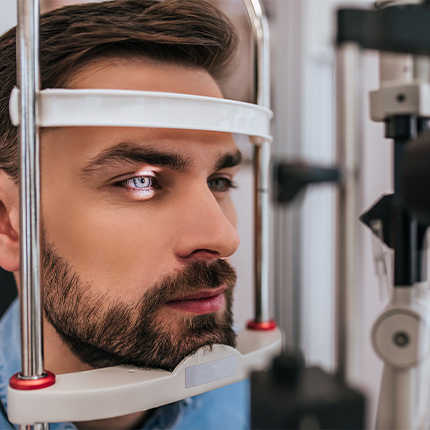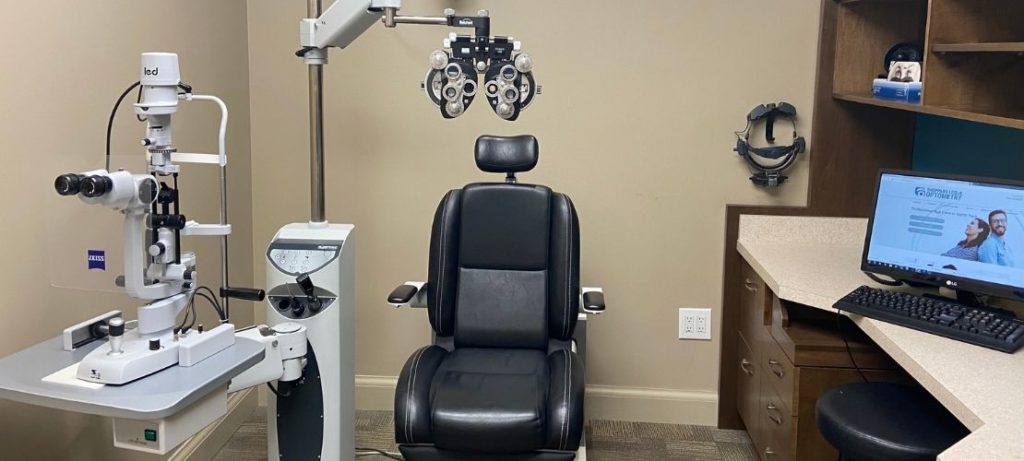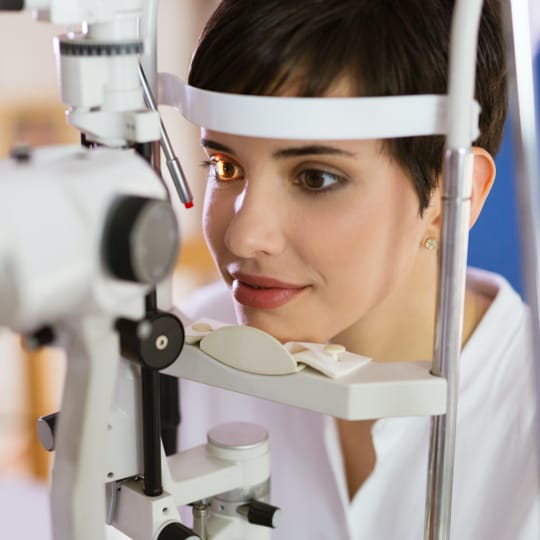Specialized Care for Diabetic Eyes
When you’re living with diabetes, regular eye exams are exceptionally important. High blood sugar can damage the sensitive blood vessels inside the eyes and an eye exam with diagnostic imaging can detect this damage even before visual symptoms show up.
Diabetes is the leading cause of blindness in Canada, but by managing your blood sugar and seeing your optometrist regularly, you’re taking two of the most important steps to protect your vision. We like to see our patients with diabetes at least once a year for a comprehensive exam, though we may recommend a more frequent personalized schedule.
At Sheppard Leslie Optometry, we have the experience necessary to look after patients living with diabetes. Please book an appointment with us today.

How Does Diabetes Impact Vision?
Just as it is essential to make healthy choices as part of your overall diabetes management plan, you can protect your vision when you make good food choices, exercise, and follow your doctor’s recommendations for living with diabetes.
Diabetes affects how your body produces or uses insulin, which is the hormone responsible for regulating blood sugar throughout your body. Too much blood sugar can cause damage throughout the body, to organs, blood vessels, and nerves. This is just as true in your eyes as in the rest of your body.Even temporary changes in blood sugar levels can lead to brief bouts of blurry vision. Over time, if blood sugar isn’t managed properly, it can lead to damage in the retina that can cause irreversible vision loss.


Diabetic Eye Diseases
Diabetic Retinopathy
Blood sugar levels that remain high for a long period can damage the delicate blood vessels in the eye. These blood vessels feed the retina, and if they break, your retina may compensate by growing even more fragile blood vessels. These new vessels can then leak fluid into the retina, resulting in blurry vision, scar tissue, and even retinal detachment, which is a vision-threatening eye care emergency.
There are often no symptoms of diabetic retinopathy until the disease advances. When the disease progresses, symptoms can include:
- Blurry or fluctuating vision
- Spots, squiggles, or strings in your vision, called floaters
- Dark areas in your vision
- Vision loss
If we detect early signs of diabetic retinopathy in our exam, our first recommendation will include you working with your general practitioner or endocrinologist to ensure your diabetes is being managed as well as possible. If the condition progresses, treatment can include medication injections, laser treatment, or an eye surgery called vitrectomy.
Diabetic Macular Edema
When diabetic retinopathy progresses over a long period of time, it can eventually impact the macula, which is the part of your eye responsible for your central vision. This leads to diabetic macular edema.
In its earliest stages, you may not notice any symptoms of diabetic macular edema. Eventually, though, symptoms can include:
- Blurred vision
- Suddenly seeing more spots (floaters) in your vision
- Colour vision that seems washed out
- Double vision
Managing your diabetes is key to preventing diabetic macular edema. Laser treatments directly target the damage within your eye with injected medication or laser therapy.
What Happens During a Diabetic Eye Exam?
During a diabetic eye exam, we will use drops to enlarge (dilate) your pupils so we can get a better view of your retina and the blood vessels within it to check for any signs of damage. Our clinic has also invested in Optomap imaging, which produces an ultra-widefield image of your retina. This offers us an even more detailed view to check for early signs of diabetic retinopathy and other eye diseases as early as possible.
We will also test your visual acuity and assess whether your prescription, if any, has changed. In the exam we’ll invite you to ask your optometrist to explain what’s happening so you can feel comfortable with and involved in every step of your care.
Eye Health Is Part of Overall Diabetes Management
High-quality eye care is an important part of overall preventive healthcare. If you have diabetes, managing your health is always a priority. Please book your appointment for a diabetic eye exam today.

Our Location

Our Address
- 1110 Sheppard Ave E., Unit 400
- North York, ON M2K2W2
Contact Information
- Phone: 416.733.4411
- Email: [email protected]
Our Hours
- Monday: 9:00 AM – 4:00 PM
- Tuesday: 10:00 AM – 7:00 PM
- Wednesday: 9:00 AM – 5:00 PM
- Thursday: 9:00 AM – 6:00 PM
- Friday: 9:00 AM – 4:00 PM
- Saturday: 9:00 AM – 2:00 PM
- Sunday: Closed
Note: Saturday hours are once per month. Please call to confirm.
Our practice is located in Oriole Place Medical and Professional Offices near North York General Hospital, easily serviced by the Sheppard subway line.

Our Services

Comprehensive Eye Exams

Dry Eye Therapy

Laser Eye Surgery Consultations

Emergency Eye Care

Our Brands





See Our Google Reviews




